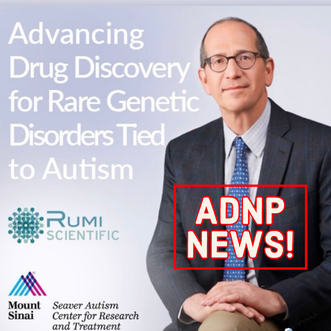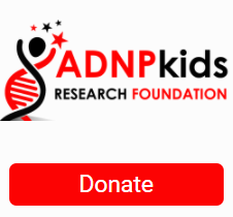Cranes New York announced today that Mount Sinai's Icahn School of Medicine on Wednesday announced a partnership with Rumi Scientific, a drug discovery company based in Midtown, to research rare genetic disorders that carry a high risk of autism.
“The collaboration is to produce human neural cell organoids in lab dishes and see if we can develop a platform for mid-throughput drug screening and ADNP was one of 3 genes selected”, said Joseph Buxbaum, director of the Seaver Autism Center and professor of psychiatry, neuroscience, and genetics and genomic sciences at Icahn School of Medicine to Sandra Bedrosian-Sermone, President of the ADNP Kids Research Foundation.
“We have focused on three genes that are involved in development, since the assay reflects early brain development”, said Buxbaum.
“ADNP is repeatedly identified as one of the top genes for autism and developmental delay”, said Bedrosian-Sermone, and continued “we can’t be more thankful to both Mount Sinai and Rumi Scientific for selecting ADNP in this potentially life changing study that could help find treatments for individuals with ADNP Syndrome.”
Icahn's Seaver Autism Center for Research and Treatment will provide patient-derived stem cells as well as engineered ones to Rumi, which uses a technology platform conceived at Rockefeller University to create tissue cultures to express specific genetic mutations. The cultures provide understanding into how gene mutation leads to autism and the potential for finding drugs to treat it.
"It's time to start thinking about using precision medicine in developmental disorders like autism," said Buxbaum.
The first portion of the partnership—growing out the cultures—should conclude by the middle of the year or even sooner, said Ilona Nemeth, CEO of Rumi Scientific. It is hoped assays for drug discovery could be ready by next year, Buxbaum said.
The two organizations began conversations about the partnership in early 2020, and Mount Sinai is Rumi's first academic institution partnership, Nemeth said.
Mount Sinai and Rumi are putting financial resources into this partnership, Buxbaum and Nemeth said, but both declined to provide details.
Much neurodegenerative brain disease research fails to enter into trials due to a lack of representative human models, Nemeth said. "This partnership allows us to achieve representative human tissue, and Seavers has those genes. This could allow us to succeed where many others have failed," she said.
Rumi Scientific was founded in 2016 and is funded by government grants, customer revenue and anchor investor funds. It received about $3 million in grants, and its revenue and raised capital are undisclosed. —S.S.
The story was picked up by Crains New York
Cranes New York announced today that Mount Sinai's Icahn School of Medicine on Wednesday announced a partnership with Rumi Scientific, a drug discovery company based in Midtown, to research rare genetic disorders that carry a high risk of autism.
“The collaboration is to produce human neural cell organoids in lab dishes and see if we can develop a platform for mid-throughput drug screening and ADNP was one of 3 genes selected”, said Joseph Buxbaum, director of the Seaver Autism Center and professor of psychiatry, neuroscience, and genetics and genomic sciences at Icahn School of Medicine to Sandra Bedrosian-Sermone, President of the ADNP Kids Research Foundation.
“We have focused on three genes that are involved in development, since the assay reflects early brain development”, said Buxbaum.
“ADNP is repeatedly identified as one of the top genes for autism and developmental delay”, said Bedrosian-Sermone, and continued “we can’t be more thankful to both Mount Sinai and Rumi Scientific for selecting ADNP in this potentially life changing study that could help find treatments for individuals with ADNP Syndrome.”
Icahn's Seaver Autism Center for Research and Treatment will provide patient-derived stem cells as well as engineered ones to Rumi, which uses a technology platform conceived at Rockefeller University to create tissue cultures to express specific genetic mutations. The cultures provide understanding into how gene mutation leads to autism and the potential for finding drugs to treat it.
"It's time to start thinking about using precision medicine in developmental disorders like autism," said Buxbaum.
The first portion of the partnership—growing out the cultures—should conclude by the middle of the year or even sooner, said Ilona Nemeth, CEO of Rumi Scientific. It is hoped assays for drug discovery could be ready by next year, Buxbaum said.
The two organizations began conversations about the partnership in early 2020, and Mount Sinai is Rumi's first academic institution partnership, Nemeth said.
Mount Sinai and Rumi are putting financial resources into this partnership, Buxbaum and Nemeth said, but both declined to provide details.
Much neurodegenerative brain disease research fails to enter into trials due to a lack of representative human models, Nemeth said. "This partnership allows us to achieve representative human tissue, and Seavers has those genes. This could allow us to succeed where many others have failed," she said.
Rumi Scientific was founded in 2016 and is funded by government grants, customer revenue and anchor investor funds. It received about $3 million in grants, and its revenue and raised capital are undisclosed. —S.S.
The story was picked up by Crains New York


